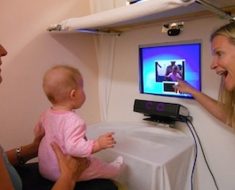
According to data from the World Health Organization (WHO), an estimated 3.17 million people died from causes related to chronic obstructive pulmonary disease (COPD) worldwide in 2015 alone.
COPD symptoms — typically shortness of breath and coughing — can be more or less severe.
However, the symptoms are often upsetting, and many of the people living with this disease experience anxiety as well. This anxiety can exacerbate a person’s health, potentially resulting in repeated visits to the hospital.
“One of the main symptoms of COPD is breathlessness. This is very frightening and often leads to feelings of anxiety,” explains Dr. Karen Heslop-Marshall, a nurse consultant at the Newcastle-upon-Tyne National Health Service (NHS) Foundation Trust and Newcastle University in the United Kingdom. “Many healthcare professionals do not currently screen COPD patients for symptoms of anxiety,” she continues, “even though it can have an impact on their overall health.”
Heslop-Marshall and colleagues recently conducted a randomized controlled trial, testing the effectiveness of one approach to helping people with COPD manage their anxiety, and reducing the number of hospital visits that COPD-related anxiety causes.
“Feeling anxious has a negative impact on patients’ quality of life and leads to more frequent use of healthcare resources,” says Heslop-Marshall. So, she and other specialists teamed up to find out if cognitive behavioral therapy (CBT) would be an effective tool for these people.
In the new study, the researchers “wanted to test whether one-to-one CBT sessions delivered by respiratory nurses could reduce symptoms of anxiety and whether this could be a cost-effective intervention.”

CBT reduces anxiety symptoms
The study worked with 236 individuals who lived with COPD and experienced symptoms ranging from mild to severe. All the participants also took tests assessing them for signs of anxiety.
In the study paper, which now appears in ERJ Open Research, the authors report that all the participants experienced at least mild anxiety symptoms, and 59 percent of them had more severe symptoms of anxiety.
To see how successfully CBT would help with COPD-related anxiety, the researchers split the participants into two groups. In one group, the team gave the participants leaflets containing advice on anxiety management. At the same time, they gave the other group the same leaflets but also CBT sessions.

Respiratory nurses specially trained to teach the participants CBT techniques that would allow them to fight off COPD-related anxiety symptoms delivered the sessions over 3 months. The nurse also assisted them in becoming more physically active.
All the participants received the medical care they needed for COPD, including if necessary, pulmonary rehabilitation, which teaches individuals with breathing conditions how best to manage their symptoms.
The researchers found that participants who received CBT for 3 months experienced fewer anxiety symptoms compared to those who had only received educational pamphlets.
More specifically, when comparing the participants’ scores by using the HADS-Anxiety Subscale — the questionnaire used to assess their anxiety symptoms — at baseline and again after 3 months, the investigators saw that the scores of individuals who had received CBT had improved by 3.4, while those of the other participants only improved by 1.9.

‘Significant impact on quality of life’
It also turned out that CBT sessions could help cut down on hospital care costs for people with COPD and anxiety.
When looking at the study participants’ hospital attendance records, the researchers concluded that each person who had received CBT saw an average saving of £1,089 (almost $1,390) in hospital admission costs, and of £63 (almost $80) in fees for emergency care.
“We found that one-to-one CBT sessions delivered by respiratory nurses could reduce symptoms of anxiety and that this could be a cost-effective intervention,” says Heslop-Marshall.
“Although the CBT intervention initially resulted in added costs, as respiratory nurses required training in CBT skills, this was balanced by the savings made thanks to less frequent need of hospital and [accident and emergency] services,” she adds.
Another key finding was that there was no association between the severity of an individual’s COPD symptoms and that of their anxiety symptoms. This, the researchers explain, suggests that even people with mild COPD symptoms can experience severe related anxiety.
“Reducing the levels of anxiety patients experience has a significant impact on their quality of life as well as their ability to keep physically active and may improve survival in the long-term. Our research shows that front-line respiratory staff can deliver this intervention efficiently and effectively.”
Karen Heslop-Marshall
Source: Read Full Article





